- Home
- Jerry B. Jenkins
Riven Page 20
Riven Read online
Page 20
“I’m not a type. I have range. I played the leads in all the shows at Forest View when I was there.”
“You worked with Clancy? So did I! Well, let me call him and maybe something will open next spring you could audition for.”
Walter was going to call Clancy Nabertowitz? That would be the end of that.
Brady had been free only a few hours, and already he was tired of walking. As soon as he could get out from under his Laundromat debt to Tatlock, he’d have to start a car fund again. He wouldn’t need anything fancy. Just something to get around in.
Two things weighed on him as he trudged back to Addison. How was he going to tell Petey? And what would he do if Alejandro couldn’t find more work for him or a bunk in the laborers’ shack? Staying even one more night in the trailer suddenly sounded unbearable.
By the time Brady got back to the trailer park, Stevie Ray was pulling in from work. Brady jogged to his place. The baby was at day care, and Stevie’s wife was still at work. Stevie had kicked off his boots and was sitting on the couch with a brew. “Grab yourself one from the fridge, Brady.”
“You know what?” Brady said. “I appreciate it, but I hate beer.”
“Yeah?”
“I do, man.”
“If I drank like you, I’d hate it too,” Stevie said. “You don’t have to drink all you have, you know.”
“I don’t even like just one.”
“That a fact? You know why I like it? I need something to take the edge off, mellow me out.”
“Me too,” Brady said, “but I can’t stand the taste.”
“What about weed?”
“Too expensive.”
“But you like it?”
“Who doesn’t?”
“In the can on top of the fridge. Go for it.”
“No money,” Brady said.
“I’m not selling, bud. I’m offering you one. Smoke yourself some dope.”
Brady and Stevie passed the joint back and forth. It did mellow Brady out, but the combination of alcohol and marijuana made Stevie giggly. As Brady poured out his story, telling the truth to the only person he trusted, Stevie kept covering his mouth to keep from bursting out laughing. That made Brady mad, but he would never let it show.
“Man,” Stevie said, eyelids heavy, “you’re hosed. Listen, if nothing works out, you can crash here.”
“You’d better talk to your wife about that, dude.”
Stevie didn’t seem to hear him at first, but then it seemed to dawn on him. “Oh yeah! Her! I am married, ain’t I?” And he slid to where he was lying on the couch, laughing hysterically.
Brady showed up at Dennis Paving just before seven and found Alejandro at the door, pulling on his jacket.
“Bad news and good news,” Alejandro said. “For a while I got no more hours for you than what you have now. But I like your work. The other guys like you, so next time we have an opening or a big job where we can add more hours, it’s yours.”
“Okay. Well, thanks. What’s the good news?”
“The laborers have an extra bunk in the shack, and until you get more hours, they’ll let you have it for a half share of the rent. You’ll be helping each other out.”
“How much is that?”
It was half of what Brady was making, and of course he still had payments due to Tatlock. He knew it was a foolish investment and probably twice what his own mother would charge. But something about the freedom it promised made him take it on the spot.
“When you’re done tonight,” Alejandro said, “check it out. Manny will show you. Those guys have fun over there, man. They live for the weekend, but they’re good guys.”
Brady worked with more enthusiasm and precision than he had in a long time, even with the weed still in his system. That was another thing. All the laborers talked about, besides their money and their booze and their women, was weed. He ought to be able to score some anytime he wanted it now.
Life was looking up. He still had to talk to Peter, and he was going to have to reassure him that he would still be close by and they would see a lot of each other. But things were going to work out.
28
Adamsville
Thomas and Grace Carey had never raised their voices to each other. Like their parents before them, they didn’t believe in it. They had their arguments, their disagreements, their pet peeves. But these they discussed behind closed doors, and their goal—Thomas was proud to tell anyone he was counseling on marital issues—was to compete to see who could first clear the air. It was not about winning, he always said. It was about putting others above yourself, starting right there at home.
At times, he admitted—if only to himself—that the most irritating thing about Grace was her perfection. Worse, she wasn’t even smug about it. She lived the life he strived for, and frankly it occasionally drove him nuts. Just once he’d like to see her lose it, raise her voice, stomp, slam a door. Lord knew, Thomas sometimes deserved it.
Living with a saint was sure better than the alternative. He didn’t like tension, and there rarely was any. He found it easy to prefer her interests over his own, unless he was tired or cranky and, thus, selfish.
Of course, over the years, Thomas had learned that his idea of marital discord was markedly different from that of his parishioners. He joked about toilet paper rolls being set to issue from the front or back or whether husbands had it in them to ask for directions. Or who should do which chores and when. As he got older, the stares in the audience grew blanker when he discussed such knotty problems. When couples or individuals sought him out for counseling, their issues were pornography, affairs, second and third marriages.
For years, Thomas had felt hopelessly out of date and had learned the hard way that he had to give up his idea that most Christian couples wanted to please the Lord and each other and could learn to quit being so selfish. His last counselee had wanted to know whether he should tell his pregnant wife about his pregnant girlfriend. Lord, have mercy.
Thomas was grateful that little of what he discussed with inmates—at least so far—had to do with their wives or girlfriends. Those still married enjoyed rare visits, but there was no touching, not even pressing hands against the Plexiglas, let alone conjugal visits. Few marriages survived, and those that did were not seeking outside help, especially from a chaplain.
But now as Thomas sat across from the love of his life, he was as close to sharply disagreeing with her as he had ever been. She continued to insist that she was feeling better and had just been run-down, when it was vividly clear to him that she was deteriorating.
“Gracie, I love you and know you can’t be well. You move in slow motion. The bruising on your arms is not going away. You’re pale and drawn. Now you must see a doctor.”
She asked to put it off for another few weeks. But the holidays were approaching—her favorite time of the year. She would want to entertain, to go caroling, to bake, to wrap and send presents. She was clearly not up to any of that.
“Promise me,” he said. “Two weeks from today you’ll get a checkup.”
“We’ll talk about it then,” she said, and it was all Thomas could do to keep from slamming his fist on the table and demanding that she promise.
His last resort would be to enlist Ravinia’s help. For all the heartache she had caused them both, Rav still deeply cared for and worried about her mother.
Addison
The laborers’ shack was worse than Brady could have imagined. When he arrived, most of the men were crowded around the television, watching a boxing match, drinking, smoking, and cheering. The smoke-clouded place was a mess, clothes and garbage everywhere, and it stank.
Manny, tall, bronzed, and in his early twenties, met Brady at the door wearing only sweat shorts. The others looked away from the TV just long enough to greet him. They appeared to be brothers, but he knew better. They teased each other and threw things. Trash and full ashtrays lay everywhere.
The shack was tiny, just two stories linke
d by a stairway so narrow that only those heading the same direction could move at one time. A small, hopeless kitchen and a foul full bath were on the first floor, along with the TV room and a small side room that seemed to be everyone’s dumping place.
Upstairs was another full bath and two bedrooms, each of which had four bunk beds jammed in it. Hooks and nails on the wall served as closet space, and one bunk had a wood chest at one end.
Manny pointed out the lower bunk in the corner. “That would be yours, amigo, for half price until you get more work. You gonna get more work?”
“Hope so. Alejandro’s looking.”
“You got all day, man. Sling burgers or something.”
“Good idea.”
“So, you in? Everybody kicks in for beer and chips. Everything else, we’re on our own.”
“I don’t drink.”
“No? Oh, man! Well, if you don’t pay, you can’t even have one, comprende?”
“Sure.”
“You do weed?”
“Some.”
“That’s on you. It’s around, but everybody pays for his own. Pepe supplies us, if you don’t have somebody. But don’t take anybody else’s. That’s bad news, man.”
“Got it.”
“So, how about it? What can I tell the guys?”
“Well, the rent is gonna hurt me until I can find more work, but shoot, yeah. When can I move in?”
“Take a walk with me, Petey,” Brady said a few minutes later. It wasn’t easy, but he carefully explained everything.
The boy was silent.
“I know it’s gonna be hard, but I’ll be around.”
Peter shook his head and appeared to be fighting tears. “I can’t believe you’re doing this. Leaving me here with Ma?”
“I warned her again. She knows I’ll be close by.”
“She’s gonna take it out on me.”
“Take what out on you? She doesn’t care if I stay or go.”
“Wanna bet?”
They headed back to find Peter was right.
“Why would you wanna stay with a bunch of Mexicans when you’ve got your own place right here?” she said.
“You said you were going to charge me.”
“Well, yeah! There’s no free lunch in this life, you know. Now what kind of a dive is that?”
“It’s nice. None of the guys smoke, at least inside, and one of ’em cooks dinner every night.” Brady amazed himself with his own imagination. “It’s a big place, two guys to a room, and there’s four bathrooms.”
“Don’t think you can be coming around here and mooching off me, raiding the fridge and all that.”
“What, you don’t have any mold I can have? I’ll be around to see Petey; that’s all. And I’ll be checking up on him.”
“Checking up on me, you mean.”
“’Course.”
Brady couldn’t wait to go. He started packing that very night, but he soon realized he had way too much stuff. There would be nowhere to stash it at the shack. He began giving things to Petey, including clothes that wouldn’t fit the kid for years. Even some sports equipment.
Finally he rummaged around atop a closet and dug out the sawed-off shotgun his father had left him. It likely hadn’t been shot in ten years, but a box of ammo lay near it.
“Where do you think you’re going with that?” his mother said.
“It’s mine.”
“You’re not even old enough to use it.”
“It’s still mine. Dad left it to me.”
“I think he thought you’d be here with it to protect us.”
“From what? There’s nothing in here worth stealing.”
“You never know. I feel better knowing we got us a weapon anyway.”
“Then get your own, Ma. You might have to defend yourself against me someday.”
“Don’t flatter yourself. You don’t have the guts.”
“Just give me a reason.”
Brady threw the big cardboard box containing all his worldly goods onto his shoulder and kicked the door shut on his way out. He couldn’t bring himself to look one last time at Petey. He kept telling himself he’d come by often. It wasn’t like they were going to become strangers.
He set the box down next to the stoop and wriggled beneath the trailer to retrieve the carton of his mother’s cigarettes he had stashed near the back axle. On his way out, he brushed the underside of the trailer, which brought his mother stomping to the door.
“What’re you doing under there?”
“Never mind, I just dropped something.”
“Stay out from under my house. You don’t live here anymore.”
“Thank goodness!”
Brady waited until she had closed the door again before he slipped the carton into the big box. By the time he got to the shack, his whole body ached. None of the Mexicans gave him so much as a second glance as he hauled his stuff upstairs and hung some clothes on the wall and stuffed most everything else, including the shotgun, under the bed.
He wandered back down and sat behind everyone else to watch the fights, only to realize that they had the Spanish translation on. Well, that made sense. But was this all they ever watched? No, he found out they also watched an all-Spanish station and lots of soccer. He was more than a guest, but he was also the single minority. Freedom was all this place had to offer, but he would take what he could get.
When no one seemed to be going to bed by midnight, Brady, bored and exhausted, went upstairs. He couldn’t sleep. The place was drafty, and he wasn’t used to the cheap bunk yet. And when the others did finally begin drifting up between one and two in the morning, they were noisy. Drunk and high, they seemed to fall asleep quickly, but several also snored.
Wonderful.
In the morning, Brady walked the main drag a couple of miles until he got to the fast-food joints. Unfortunately, they were all busy with the breakfast rush and told him to come back midmorning with his résumé.
“Don’t have one,” he said.
“That’s all right. Fill out this form and bring it back.”
Talk about a creative imagination. By the time he got through with those forms, he’d have hired himself.
By noon he had learned that none of the places had any manager or assistant manager positions open. In fact, they didn’t even have supervisory roles. But each place offered him a job, including a cheesy vest and jaunty cap, if he was willing to dunk fries and wrap burgers and learn the cash register.
Burger Boy offered ten cents an hour more than the rest, and he could work 10 a.m. to 6 p.m. Monday through Friday. At that rate, he could pay off Tatlock, pay his room rent, and start saving for a car. The trick was going to be keeping this from his housemates. If they knew he had work, they’d want more rent.
He could tell them no one was hiring, but what would he do with his yellow and white Burger Boy outfit? Maybe he could stash it at Stevie Ray’s. He’d leave it in a box under the steps and pick it up on his way to work and drop it off on his way back. Then he could go straight to the forklift truck and get in his shift at Dennis Paving.
Alejandro finding him more work couldn’t come soon enough. It was going to take every last ounce of Brady’s dignity to stand behind a counter looking like an Up with People singer.
Brady arrived at Stevie Ray’s and told his wife he’d just wait outside till Stevie got home. She brought the baby out and sat on the steps next to him.
“What’re you up to these days, Brady? Still getting hammered?”
“Nah. That was just a one-time thing. Sorry if I kept you up.”
“You weren’t the first and you won’t be the last.”
“Just got a job managing Burger Boy,” he said.
“No kidding! Good for you.”
He told her where he was living and that he didn’t want to make his coworkers jealous. Brady laid out his plan of how to hide the uniform each day.
“No problem with me,” she said. “But what do you care what they think? You s
hould tell them to buzz off. Just ’cause you’re more industrious than they are is no reason for them to be jealous. If you can get a job like that, so can they.”
“You’re probably right. After a while I’ll tell them, but meanwhile . . . ?”
“You can leave it here every day, sure.” She looked at her watch. “Gotta get Stevie Ray’s spaghetti on. You want to join us? We’ve got plenty.”
29
Adamsville
Thomas was alarmed to arrive home from work and find Grace napping. He actually bent close to be sure she was breathing. She was normally a light sleeper and roused at any noise, especially if he was moving about. But now she did not stir.
Thomas changed and headed to the kitchen to prepare them a light supper. Surely she would hear him eventually. But this was good, right? She needed her rest. He chastised himself for agreeing to let her wait two weeks before seeing a doctor.
Thomas brought a tray in to her with tea, soup, and a grilled cheese sandwich. He set the tray on her bedside table and put a hand on her shoulder. Nothing. He carefully sat between her and the edge of the bed. Her breathing remained even and deep.
Noise, movement, the smell of food, his touch—nothing woke her?
Thomas sighed and moved into the living room, where he phoned Ravinia. As usual, she sounded rushed. But she fell silent when he informed her of his concerns.
“As long as she’s resting, let her, but, Dad, you can call a doctor yourself. Who cares if she gets upset? It’s what’s best for her.”
“What does it sound like to you, Rav?”
“I don’t know. Something in the blood? Some kind of a deficiency? She’s too young for it to be age-related. Likely something easily treated. Keep me posted, will you?”
“Of course.”
“And I suppose you’re eager to know how Dirk is . . . ?”
Thomas had to smile. Caught. No, he had not been wondering about Dirk’s welfare. He had been guilty of avoiding the elephant in the room. Thomas was hoping and praying for a miracle, that Rav would come back to her faith, that Dirk would become a believer, that they would marry. “Yes, how is Dirk?” he said, painfully aware that his awkwardness was obvious.

 The Betrayal
The Betrayal The Valley of Dry Bones
The Valley of Dry Bones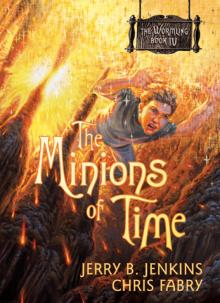 The Minions of Time
The Minions of Time Wild Rescue
Wild Rescue Though None Go with Me
Though None Go with Me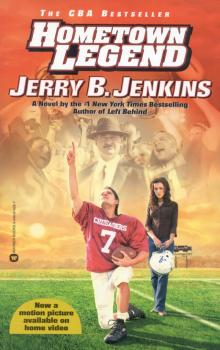 Hometown Legend
Hometown Legend The Breakthrough
The Breakthrough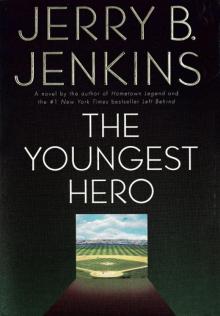 The Youngest Hero
The Youngest Hero Nicolae High
Nicolae High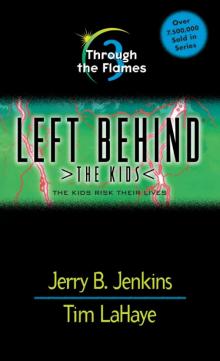 Through the Flames
Through the Flames The Brotherhood
The Brotherhood Grave Shadows
Grave Shadows The Changeling
The Changeling Shadowed
Shadowed Precinct 11 - 01 - The Brotherhood
Precinct 11 - 01 - The Brotherhood Second Chance
Second Chance Silenced
Silenced The Vanishings
The Vanishings Dead Sea Rising
Dead Sea Rising Soon
Soon The Author's Blood
The Author's Blood The Sword of the Wormling
The Sword of the Wormling Left Behind - The Kids 02 - Second Chance
Left Behind - The Kids 02 - Second Chance Haunted Waters
Haunted Waters The Underground
The Underground Mark's Story
Mark's Story Shaken
Shaken Deceived
Deceived Frantic
Frantic Riven
Riven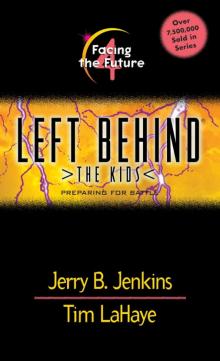 Facing the Future
Facing the Future Stung
Stung I, Saul
I, Saul Hunted
Hunted Arrived
Arrived John's Story
John's Story Stolen Secrets
Stolen Secrets